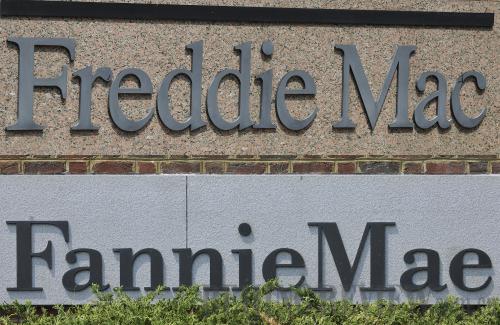|
 |
|
TWO NIGHTMARES: The future of mortgage finance giants Fannie Mae and Freddie Mac has come into question as the U.S. Government considers cutting stimulus and other aid as debts pile up in the two companies (ZHANG JUN) |
As U.S. mortgage finance giants—Fannie Mae and Freddie Mac—try to sell their huge backlog of foreclosed homes, they face foreclosures themselves as the U.S. Government contemplates cutting their government-backed support as indicated by a white paper issued by the Obama administration in February.
Zhang Monan, an associate research fellow with the State Information Center, said the downfall of Fannie Mae and Freddie Mac is the result of abuses of privileges the two companies have enjoyed since their inception.
The future of U.S. mortgage lenders Fannie Mae and Freddie Mac is closely related to the fate of the U.S. housing and financing markets, and their possible meltdown has become a warning to market players around the world.
The two companies are representative of the abuse of national privilege. Their financing costs were as low as the U.S. Treasury securities, which spurred rampant expansions in their operations. Now, the two companies' huge business transactions have jacked up housing prices and triggered property bubbles in the U.S. market.
Fannie Mae and Freddie Mac are the products of the U.S. Government's anti-property crisis efforts in the 1930s following the Great Depression. The collapse of the U.S. housing market in the wake of the Great Depression discouraged private lenders from investing in home loans. Fannie and Freddie were established to provide local banks with federal money to finance home mortgages in an attempt to raise the number of home ownership and the availability of affordable housing, essentially playing the role of "central bank" in the U.S. property market. They buy mortgages on the secondary market, pool them, and sell them as a mortgage-backed security to investors in the open market.
This government guarantee is the core of their profitability method. Although the two companies are privately owned and operated by shareholders, they are protected financially by the support of the U.S. Government. This means the profits generated by the two companies are divided by private owners, while the losses are shouldered by American taxpayers.
The U.S. Government provides Fannie and Freddie with a variety of favorable policies, including access to a line of credit through the Treasury, and exemption from both state and local income taxes and from the U.S. Securities and Exchange Commission oversight. Before the government takeover in 2009, the two giants held approximately $5.4 trillion in mortgage debts, 44 percent of all market scale.
After the financial crisis erupted, the U.S. Government spared no effort in saving these too-big-to-fail companies. In May 2009, the U.S. Government announced to buy $1.25 trillion worth of property mortgage bonds as well as $175 billion in bonds from the two companies. But now, the strong government support has made the two companies even more dependent on the government bailout.
To date, Fannie and Freddie have soaked up bailout funds worth $1.5 trillion. Their combined bonds accounted for nearly 40 percent of the Fed's debt, making the two mortgage lenders a black hole swallowing taxpayers' money. Worse still, the toxic assets resulted from the property bubble burst have not been entirely resolved. Two major problems in particular could explode, causing further damage: First, the market does not have the privilege of open access to the balance sheets of these financial institutions; and second, as liquidation has yet to be carried out in collateralized debt obligation and credit default swap markets, the market has no idea whether a financial institution still holds toxic assets or what's the scale of the toxic assets they are holding.
The U.S. property market has plunged 30 percent since the subprime mortgage crisis broke out. Coupled with high unemployment and deleveraging, the U.S. Government still hasn't made up its mind on a course of action in dealing with Fannie and Freddie. If it cannot handle the two companies properly, a new blizzard will sweep the U.S. financial and property market and might further crash investors' confidence in the U.S. dollar, which may trigger a collapse of the U.S. debt chain.
Estimates show China currently holds $300 billion-400 billion in Fannie and Freddie bonds. Although the U.S. Government guarantees the interests of the bondholders, China will not be able to safely retreat from the bond market, because as long as the United States starts to phase out the two companies, their bonds will become worthless junk bonds.
The lessons of Fannie and Freddie will be costly. They enjoyed enormous U.S. Government privilege, but were operated as private institutions. The split of function spurred the two companies to expand blindly, leading to distorted balance sheets that eventually triggered the subprime mortgage crisis. As for China, we should review our ability to control foreign reserve risk and turn away from investing in bonds to investing in stocks. The foreign reserve authorities should make full use of the huge amount of foreign exchanges to support domestic companies to go out to the international market. | 